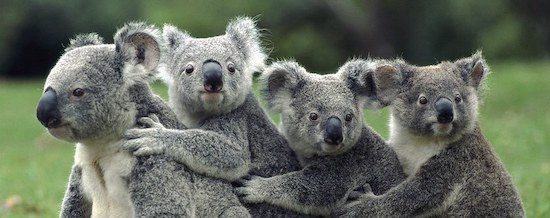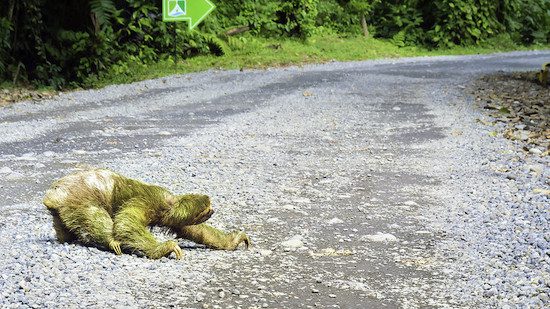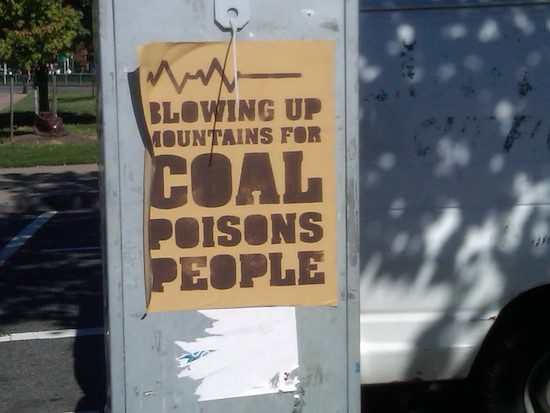


Change: The horrific images of burnt and dying koalas from the recent bushfires all over the east coast of Australia have underlined a tragic reality: Koalas are in danger of becoming extinct. As the nation experiences record-breaking drought and bushfires, koala populations have shrunk along with their natural habitat. A third of koalas in Australia’s New South Wales region may have been killed in the deadly bushfires, but deforestation has meant that the koalas were already under threat before the fires. Koalas only live in Australia and rely on eucalyptus trees to survive. But these trees, which are the koalas’ only food source, are being destroyed at an alarming rate. Shockingly, koalas are in peril but are yet to be listed as an endangered species by the government. Koala populations in the states of New South Wales and Queensland fell 42 percent between 1990 and 2010, according to the Commonwealth Scientific Committee. Some experts say there will be no Koalas left by 2050.
>>>Urge the Australian government to immediately list the koala as an endangered species so that they can receive the support they need to survive.
The Rainforest Site: Pigeon shoots have been banned in every part of the country except for the state of Pennsylvania, In 2014, a bill to end pigeon shoots in Pennsylvania was allowed to expire after the NRA stepped in at the 11th hour with their powerful lobbyists—though 75 percent Pennsylvanians are in favor of a law that would ban this inhumane “sport” and 83 percent believe it’s an unnecessary form of animal cruelty. “After each round of shots at the birds, participants—sometimes children—take to the field to collect wounded and dead animals,” according to the Humane Society of the United States. “If the suffering pigeon is still alive, the collector will sometimes snap the animal’s head off or slam her against the ground before tossing her into a barrel full of dead and dying pigeons.” Many of these birds are not even from Pennsylvania. Footage of people netting and stealing pigeons in New York City is believed to point to an illegal smuggling ring that transports the birds over state lines to provide the live targets for the merciless shoots.
>>>Urge Pennsylvania lawmakers to ban pigeon shoots.
Lady Freethinker: In Agadir, Morocco, authorities are dumping street dogs in a hellish “pound” without access to any food or water. Left to starve, the desperate dogs have started to turn on one other, attacking and eating the weakest among them just to stay alive. In the dusty, bare compound, the ground is piled high with feces. Without vaccinations, healthcare or a sterilization program, sick dogs are giving birth to puppies in these appalling conditions. They have no chance of survival. Volunteers from Morocco Animal Aid (MAA) are doing everything possible to help these emaciated, dying animals. However, authorities are denying that these horrors are even happening and actively refusing MAA access to the site. In spite of restrictions, the charity rescues the sickest dogs when they can, but are already overloaded. When they are allowed access, they fill up water containers and clean up piles of filth, but it’s not enough.
>>>Tell Ambassador of Morocco to the U.S. Lalla Joumala Alaoui to urge the Moroccan government to save these dogs and develop more humane ways to deal with strays in their country.
Cause for concern…

- Humanity’s footprint is squashing world’s wildlife (Wildlife Conservation Society, ScienceDaily)
- Chinese paddlefish, one of the world’s largest fish, declared extinct (Samuel Osborne, The Independent)
- Australia fires: humanitarian group describes ‘apocalyptic’ scenes of wildlife devastation on Kangaroo Island (Adam Morton, The Guardian)
- Analysis confirms that climate change is making wildfires worse (Donna Lu, New Scientist)
- 5,000 thirsty feral camels shot and killed by authorities in drought-hit Australia (Bangkok Post)
- Earth’s hottest decade on record capped by years of storms and wildfires (Bob Berwyn, InsideClimate News)
- World’s oceans warmest since records began as climate change accelerates rate of heating (The Telegraph)
- U.S. Forest Service allows mining company to write its own environmental analysis: report (Brooke Seipel, The Hill)
- Just 88 companies are responsible for ruining the oceans (Yessenia Funes, Gizmodo)
- Ocean waters off West Coast acidifying at twice the rate of global average (Kale Williams, Portland Oregonian)
- Coal endures as world’s favorite fuel for electricity generation (Will Mathis, Bloomberg)
- Factory farm conditions are unhealthy for animals and bad for people, too (Tia Schwab, Stone Pier Press, Independent Media Institute, Truthout)
- Cruelty for cheese: Dairy cows scream in pain while their horns are removed without anesthesia (Eliza Erkskine, One Green Planet)
- The world is hungry for octopus, but some scientists are arguing against farming them on ethical grounds (Ariella Simke, Forbes)
Round of applause…

- Shutdown of coal-fired plants in U.S. saves lives and improves crop yields (Christine Clark, UC San Diego)
- In 2019, we made big strides for companion animals in puppy mills, dog meat trade, research and more (Kitty Block, Humane Society of the United States)
- If animals could vote, Judie Mancuso would be president: This month, three California laws kicked in that protect non-humans, and she started them all (Brooke Staggs, Orange County Register)
- 2019 was a banner year for big, bold billboards ads sparking discussions about speciesism (PETA)
- From more vegan celebs to more vegan options, 2019 saw serious progress in plant-based eating around the world (Avery Yale Kamila, Press Herald)
- Plant-based foods make up the majority of Grubhub’s Top 10 Foods of 2019 (Caroline Bologna, HuffPost)
- Plant-based burgers, cauliflower steak and oat milk: Food trends that will take over in 2020 (Eliza Erskine, One Green Planet)
- 9 vegan travel destinations, from people who’ve been there and eaten the food (Miranda Larbi, HuffPost UK)
Parting thought…
We don’t own the planet Earth, we belong to it. And we must share it with our wildlife. —Steve Irwin
Earth | Food | Life (EFL) explores the critical and often interconnected issues facing the climate/environment, food/agriculture and nature/animal rights, and champions action; specifically, how responsible citizens, voters and consumers can help put society on an ethical path of sustainability that respects the rights of all species who call this planet home. EFL emphasizes the idea that everything is connected, so every decision matters.
Click here to support the work of EFL and the Independent Media Institute.
Questions, comments, suggestions, submissions? Contact EFL editor Reynard Loki at [email protected]. Follow EFL on Twitter @EarthFoodLife.